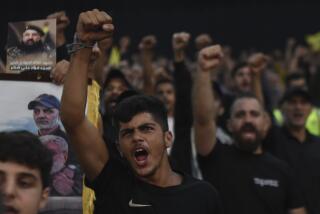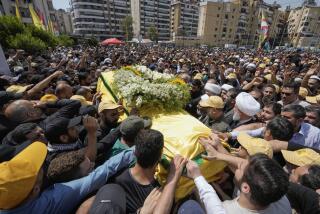Iraqi Death a Warning, Analysts Say
- Share via
CAIRO — The speedy elimination of Saddam Hussein’s son-in-law after Iraq’s most famous defector was lured back to Baghdad has proved once again the ruthlessness of the country’s ironfisted leader and shown that his grip on power is now more secure than ever five years after the Persian Gulf War, analysts said Saturday.
As he has in the past, Hussein sent a warning to all would-be opponents, including any that might exist within his own tight family circle, that the penalty for betraying him is death, the analysts said.
It is now considered unlikely that Hussein will ever face a meaningful challenge to his power from inside Iraq. Moreover, the way may now be clear for a Hussein dynasty, with his son Uday waiting in the wings as a possible successor.
Iraqi state-controlled media portrayed the death of Lt. Gen. Hussein Kamel Majid and his brother and fellow defector, Saddam Kamel Majid--both married to Saddam Hussein’s daughters until Thursday, when the women divorced them--as the result of divisions inside the influential Majid clan.
Those divisions, the state media said, led to a pitched gunfight Friday afternoon at the suburban Baghdad villa where the defectors had lived since returning Tuesday from Jordan. According to the state media, the two defectors, their father and a third brother were killed by cousins who demanded their blood to remove the stain on the family honor caused by the betrayal of their high-profile defection in August.
That account, however, found little credence Saturday among analysts and the Iraqi opposition in exile, especially after the state endorsed the killings by awarding a heroes’ funeral to two men who died storming the Majids’ home.
“Saddam Hussein cannot tolerate any questioning of his authority and needed to make an example of these two,” said Michael Barron, senior Middle East analyst with the Control Risks Group consulting firm in London. “It was a fairly brutal display of power.”
Jordanian Foreign Minister Karim Kabariti expressed indignation at the killings, saying that the defectors had left their sanctuary in the Jordanian capital, Amman, only because they “were given the impression that they would be safe and they were pardoned.”
The U.S. ambassador to the United Nations, Madeleine Albright, said of Hussein, “His brutality knows no bounds.”
*
Such criticism will make no difference to Hussein, according to the analysts, because his only concern is staying in power. And with the coldblooded elimination of his own sons-in-law, he has removed any chance of an internal threat.
“No one is going to dare try anything,” Barron said.
Even if international disgust at the killings hurts Iraq in its talks with the United Nations to resume international oil sales, the effect will be short-lived, said Jordanian political scientist Labib Kamhawi, a veteran Iraqi observer: “Worse episodes were forgotten in their time.”
The killings put to rest any lingering suspicions about whether Hussein Kamel Majid’s defection was authentic. During his six-month Jordanian exile, Majid--who had run the military-industrial complex responsible for Iraq’s secret weapons program--was shunned by other foes of his father-in-law because it was felt that such a close associate of the Iraqi leader could not be trusted.
*
Disappointment at his continued isolation in Jordan, the persistent pleas of his wife, Raghad, to return, and assurances from family intermediaries that he would be safe in Baghdad were behind his fatal decision to go back.
What remains unclear is what role Uday Hussein, the Iraqi strongman’s violent and ambitious eldest son, may have had in the killings.
Uday has been blamed for several murders and is described by a U.S. official as “truly one of the world’s thugs.” He became by default the second most powerful person in Iraq when Majid--whom Hussein treated like a son--fled the country last year.
Now that Majid has been eliminated, Uday’s path to power is apparently clear.
“We think that Uday is paving the way to be his father’s successor by removing anybody who might oppose this nomination,” said Hamid Bayati, a representative of one of the main Iraqi opposition groups in London.
Significantly, it was Uday who welcomed Majid back to Iraq and Uday’s television station that first trumpeted the news that he had been killed.
More to Read
Sign up for Essential California
The most important California stories and recommendations in your inbox every morning.
You may occasionally receive promotional content from the Los Angeles Times.













